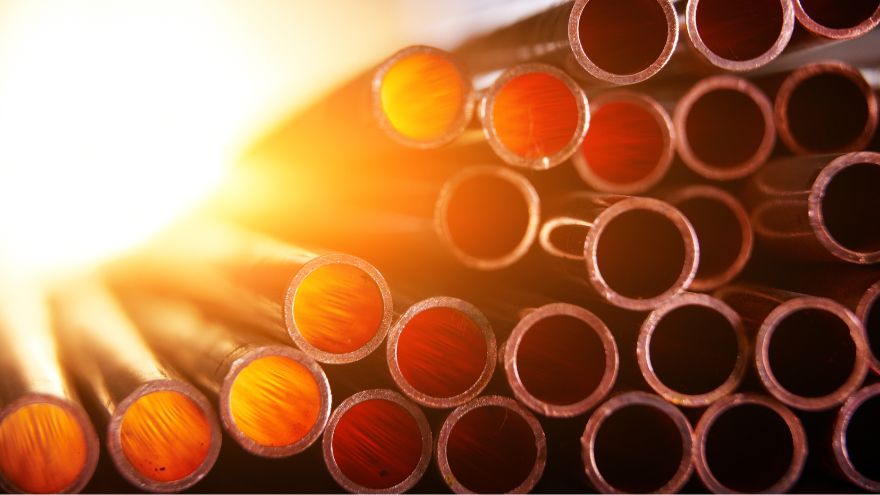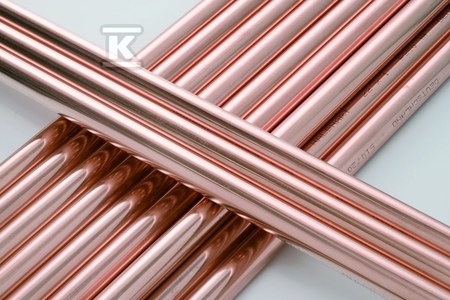When planning to replace or create a water supply system, we must take into account a number of factors. One of the most important is the selection of pipes. Copper pipes are especially recommended because they have excellent properties. Let's get to know them and learn other useful information about this type of pipes.

Check out copper pipes at the Onninen wholesaler
Copper in water supply installations - what are its characteristics?
Copper has been mined since ancient times, and its properties cannot be overestimated. Apart from iron, it was of great importance for the development of human civilization. Currently, it is used in a huge number of areas, especially in the production of electrical cables, roofing, industrial machinery and water supply installations. And it is this last application that interests us particularly in the context of the topic discussed here.
Copper - as a bacteriostatic material - is commonly used for drinking water installations. This means that the copper installation prevents the growth of bacteria and other microorganisms, while not affecting the taste or smell of the water. Moreover, in this type of installations, thermal disinfection can be easily carried out at very high temperatures, over 70 degrees Celsius. This allows you to fight bacteria without causing any negative effects on the durability of the installation.
Water quality in copper pipes
 The material from which the water supply system is made has a significant impact on the quality of drinking water. In the case of copper pipes, we can be sure that it will not be contaminated in any way. In this context, the guidelines that the water flowing through this type of installations should meet are very important. First, it must have a pH>7. The second important issue is the content of nitrate ions less than 30 mg/l. And finally, thirdly - the ratio of total alkalinity to sulfate ions must be greater than 2. It is no accident that copper installations must be made of pipes in accordance with the PN-EN 1057 standard. This standard specifies the most important requirements regarding, among others, mechanical properties, chemical composition, dimensions and tolerance, surface quality and cleanliness, etc. The topic of requirements is much more extensive, so it is worth dwelling on these issues longer.
The material from which the water supply system is made has a significant impact on the quality of drinking water. In the case of copper pipes, we can be sure that it will not be contaminated in any way. In this context, the guidelines that the water flowing through this type of installations should meet are very important. First, it must have a pH>7. The second important issue is the content of nitrate ions less than 30 mg/l. And finally, thirdly - the ratio of total alkalinity to sulfate ions must be greater than 2. It is no accident that copper installations must be made of pipes in accordance with the PN-EN 1057 standard. This standard specifies the most important requirements regarding, among others, mechanical properties, chemical composition, dimensions and tolerance, surface quality and cleanliness, etc. The topic of requirements is much more extensive, so it is worth dwelling on these issues longer.
Copper water installations - requirements
In the previous paragraph, we mentioned the PN-EN 1057 standard and related requirements, but it is worth remembering that the use of copper pipes in drinking water installations requires meeting additional conditions. This applies, among other things, to the minimum wall thickness of the copper pipe, which cannot be less than 1 millimeter. What is equally important, the use of elbows is excluded, only arches are allowed. This has a direct impact on the flow speed. It is also extremely important to install a mechanical filter with the ability to retain particles larger than 80 μm. This protects the installation against stripping of the protective oxide layer. Installation sections should be connected using soft soldering if the pipe diameter is less than 28 mm. For larger medium sizes, brazing is required.
What are the diameters of copper pipes?
Due to the fact that copper pipes have low resistance (much lower than in the case of steel pipes), smaller pipe diameters can be used, which translates into less water in the installation. They are produced in three degrees of hardness and with different diameters. They can be soft with a diameter of 6 to 54 mm, sold in coils (6-22 mm) with a length of 10, 25 and 50 meters. Another option is to purchase soft pipes in bars (6-54 mm) with straight sections and a length of 3 and 5 meters. Another option are semi-hard pipes with a diameter of 6 to 159 mm (in 3 and 5 m bars) and hard pipes with a diameter of 6 to 267 mm (3 and 5 m bars). In addition, pipes with thermal insulation in the form of covers and laggings are also available. In the case of soft pipes, such insulation, usually 2-3 mm thick, made of PVC, additionally protects against damage. For harder pipes, hard PIR foam is chosen.
To sum up, copper pipes in drinking water installations are particularly recommended for their excellent properties. It is no coincidence that they are so willingly chosen for various investments.